Plenary Speakers
Department of Bioengineering
Pennsylvania State University
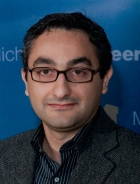
Prof. Mohammad Reza Abidian is currently an Assistant Professor at Pennsylvania State University in the Departments of Biomedical Engineering, Materials Science and Engineering, and Chemical Engineering. He directs the laboratory Advanced Regenerative Biomaterials and Therapeutics for Neural Interfaces, which investigates at the interface of biomaterials and electronic devices to develop the next-generation of neural interfaces. His lab utilizes interdisciplinary approaches for development of low cost and high throughput medical devices and technologies for regenerative engineering, diagnosis, and treatment with an emphasis on neural interfaces and neurological diseases, in particular for neural recording and stimulation, neural tissue regeneration, drug delivery to brain tumor, and neurochemical sensing. Prof. Abidian has received many awards and honors including Materials Research Society Silver Award, the University of Michigan Rackham Pre-Doctoral Fellowship, College of Engineering Student Distinguished Achievement Award, and Plenary Speaker in 2nd and 3rd US-Turkey Advanced Study Institute on Healthcare Challenges, sponsored by the NSF in Antalya, Turkey. His research has been featured several times on the cover of frontier journals including Advanced Materials and Advanced Functional Materials, and Advanced Healthcare Materials. Prof. Abidian received his B.S. in Mechanical Engineering and M.S. in Biomedical Engineering from Amirkabir University of Technology (Tehran Polytechnic) and his Ph.D. in Biomedical Engineering from University of Michigan. He completed his postdoctoral training in the Center for Neural Communication Technology and Plastic Surgery Department at the University of Michigan.
Professor and Chair, Department of Biomedical Engineering
Columbia University
President of IEEE EMBS
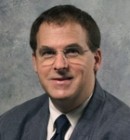
Prof. Andrew Laine is a leader in medical imaging, image analysis and signal processing, computational biology, and biometrics research. He was the first to apply multi-resolution representations for feature analysis of digital mammography and cardiac ultrasound. He pioneered work on medical imaging that he first introduced in 1992 using nonlinear processing techniques of wavelet representations for contrast enhancement. He currently analyzes real-time video 3-D ultrasounds of the heart in an effort to better understand and treat heart disease. He is developing software that will measure the strain on the muscles of the heart in real-time 3-D and localize infarcted or ischemic tissue that could be salvaged by intervention, thus recognizing at an early stage what tissue is damaged or at risk. Director of the Heffner Biomedical Imaging Laboratory at Columbia Engineering, Laine holds two patents related to 3-D processing of ultrasound, has authored more than 300 peer-reviewed papers, and has graduated more than 25 doctoral students in the field of medical image analysis. He has been a member of IEEE member for 30 years, and was elevated to Fellow IEEE in 2010. Professor Laine served as Vice President of IEEE EMB Society Publications (2007-12), and served as member of the IEEE EMB Society Ad Com (2006). He has been a member of IEEE member for 30 years, and was elevated to Fellow IEEE in 2010.
Department of Bioengineering
Pennsylvania State University
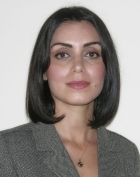
Prof. Sheereen Majd, Ph.D. received her B.S. in Mechanical Engineering from
Amirkabir Institute of Technology, Tehran. She completed her Ph.D. in Biomedical
Engineering at the University of Michigan, Ann Arbor, in 2009. Her doctoral work, under
the supervision of Dr. Michael Mayer, focused on molecular interactions on lipid
membranes. After a short postdoctoral training at the University of Michigan, Prof. Majd
Joined the Department of Bioengineering at the Pennsylvania State University as an
Assistant Professor in January of 2011.
Research efforts and interests in Dr. Majd’s group lie at the interface of electrophysiology,
biomaterials, micro/nano fabrication, and biosensing for diagnostic and therapeutic
applications. Currently, the main focus of her research group is the molecular processes
within and across cell membranes and the role of these molecular events in normal and
diseased cellular functions.
Director, Laboratories for Biomolecular Engineering and Nanotechnology
Emory University and the Georgia Institute of Technology
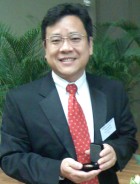
Prof. Shuming Nie is the Wallace H. Coulter Distinguished Chair Professor in Biomedical Engineering at Emory University and the Georgia Institute of Technology, with joint appointments in chemistry, materials science and engineering, and hematology and oncology. He is the Principal Investigator and Director of the Emory-Georgia Tech Nanotechnology Center for Personalized and Predictive Oncology, one of the eight national centers funded by the National Cancer Institute (NIH/NCI).
His research interest is broadly in biomolecular engineering and nanotechnology, with a focus on bioconjugated nanoparticles for cancer molecular imaging, molecular profiling, pharmacogenomics, and targeted therapy. His research program is currently supported by three large-scale grants from the National Institutes of Health. During the last 10 years, Professor Nie has published nearly 100 scholarly papers, filed 20 patents/inventions, and has delivered more than 350 invited talks and keynote lectures. In recognition of his work, Professor Nie has received many awards and honors including the Merck Award (2007), Elected Fellow of the American Institute of Biological and Medical Engineering (2006), the Cheung Kong Professorship (The Ministry of Education of China, 2006), the Rank Prize in Opto-electronics (London, UK, 2005), the Georgia Distinguished Cancer Scholar Award (Georgia Cancer Coalition, 2002-2007), the Beckman Young Investigator Award, the National Collegiate Inventors Award, and the NSFC Overseas Young Scholar Award. Dr. Nie serves on the scientific advisory/editorial boards of 5 biotech companies and 6 scientific journals. Professor Nie received his BS degree from Nankai University (China) in 1983, earned his MS and PhD degrees from Northwestern University under the direction of Professor Richard P. Van Duyne (1984-1990), and did postdoctoral research at both Georgia Institute of Technology and Stanford University (1990-1994).
Professor, Department of Biophysics, Faculty of Medicine
Dokuz Eylul University
Izmir, Turkey
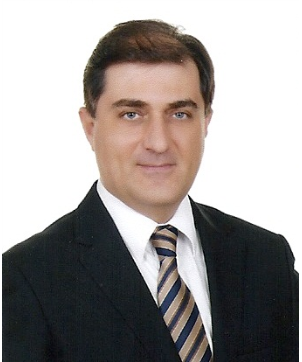
Prof. Murat Özgören, M.D. PhD. His research interests include applied brain biophysics, signal processing, information processing in the brain, multidisciplinary and translational studies in the cognitive science incorporating memory, sleep and pathological processes. He is the vice rector of Dokuz Eylul University and a member of Department of Biophysics, Faculty of Medicine, Dokuz Eylul University. He is also chair of executive board of DEPARK technology development zone. He is the chair of Sleep and Conscious States Technology Research and Application Center and also a member of the Brain Dynamics Research Center. He is the associate editor in the journal of “Sleep and Biological Rhythms”. Additionally he is a delegate of European Strategic Forum on Research Infrastructures (ESFRI), as well as having served as chair of Health and Food Strategy Working Group. He is the associate-editor of Sleep and Biological Rhythms Journal and is the member of the Editorial Board of World Journal of Anesthesiology. He reviews manuscripts for a number of journals ranging from Brain Research to Neuropyshcologia. He is the founding member of the initiative of "International Sleep Science and Technology Association (ISSTA)" as well as the Vice Chair of Asian Sleep Society. He is the Steering Committee Member of European University Association Council of Doctoral Education. He has recently launched the first Health Technopark of Turkey, DEPARK-HEALTH. He has hosted ORPHEUS and EUA-CDE meetings. Finally he has initiated the International Health Technologies Accelerator- BioIzmir, a project for soft landing to Turkey in Health related technologies.
Council for Scientific Research
Madrid, Spain
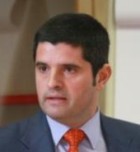
Prof. Jose Pons obtained his PhD in Physics, Universidad Complutense Madrid, in 1997. In 1998 he was appointed as Postdoctoral Fellow at the Bioengineering Group of the Spanish Council for Scientific Research, CSIC. In 1999 he was awarded a position as Tenured Scientist, in 2007 a position as Research Scientist and eventually in 2008 a position as Full Professor, all of them at the same institution. Along the last ten years of research, Prof. Pons has also served as lecturer in Polytechnic University of Madrid (Robotics and Advanced Sensors and Actuators), Alfonso X El Sabio University (Systems theory and Control), Alcalá de Henares University (Robotics and Advanced Actuators).
Prof. Pons has published along the last ten years over 70 articles in highly ranked international journals in Robotics (Robotica, Autonomous Robots, Mechanism and Machine Theory), Smart Materials, Sensors and Actuators (Sensors and Actuatos A & B, Journal of the European Ceramic Society, Bol. Soc. Esp. Cerám. V., Journal of Electroceramics, IEEE Trans. on Ultr., Ferr., and Freq. Contr.), Neuroscience (The Cerebellum, Eur. J. Neurol.), Physiology (IEEE Engineering in Medicine and Biology magazine, Physiological Measurement, Medical Biological Engineering & Computing, Technology and Health Care) or Biomechanics (Gait & Posture, Applied Bionics and Biomechanics). Prof. Pons is an active member of several scientific societies, in particular he is a member of the IEEE Robotics and Automation Society, IEEE Engineering in Medicine and Biology Society, IEEE Ultrasonics, Ferroelectrics and Frequency Control Society. He is the national contact point for the Technical Committee (TC 4.2) on Mechatronic Systems and for (TC4.3) on Robotics of the International Federation on Automatic Control (IFAC). The applicant is an active member of the Divisions of Robotics and Bioengineering of the Spanish Chapter (CEA) of the IFAC. Prof. Pons is Vice-President elect (2008-2011) of the Electroceramics and Active Ceramics Division of the Spanish Society of Glass and Ceramics.
Professor, Department of Health Science and Technology, Faculty of Medicine
Aalborg University

Prof. Thomas Sinkjær's research and teaching interests are within human motor control. His research includes basic studies of the interaction of central neural control and reflex circuitry of the spinal cord and the intrinsic mechanical properties of the skeletal muscle system. His research also involves development of new principles to restore sensory-motor function through neurotechnologies and methods to enhance functional neural plastic changes.
His interests in interdisciplinary research and means to facilitate excellence in curiosity driven research made Thomas Sinkjær accept the position as Director of the Danish National Research Foundation in 2007. In 2008 Thomas Sinkjær played a key role in securing the Foundation 3 billion DKK from the Danish Government increasing the Foundations capital to 4 billion DDK (Dec. 2009). At the same time the Foundation by law is allowed from year 2010 to increase its annual funding in long term basic research endeavors from 250 to 400 million DKK.
From 1983-09, Thomas Sinkjær has published 265 major publications, of which 201 are refereed papers (150 are listed on PubMed, 165 WoS), and the book: “Control of Movement of the Physically Disabled” (Popovic and Sinkjær, pp. 481, Springer, 2000, Second Edition 2003). Furthermore, he has taken out/applied for seven patents. Thomas Sinkjær has been rewarded with several national and international awards. He is a member of academic societies and has been Honorary and visiting Guest Professor at universities in North America and New Zealand. He holds present and past appointment within national and private foundations. Thomas Sinkjær is the co-founder of three companies and on the board of another three companies.
Professor for Systems Neuroscience & Neurotechnology,
Head, Systems Neuroscience & Neurotechnology Unit, School of Engineering, htw saar
and the Medical Faculty, Saarland University
Homburg/Saar, Germany
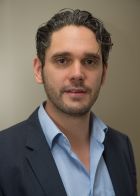
Prof. Daniel J. Strauss received a Ph.D. degree in Mathematics and Computer Science from the University of Mannheim, Germany, and a Ph.D. degree in Theoretical Medicine as well as the Habilitation from the Faculty of Medicine the Saarland University, Germany.
Prof. Dr. Dr. Strauss was a scientific assistant at the Faculty of Mathematics and Computer Science at the University of Mannheim, Germany from 1999 to 2001 and scientific assistant at the Department of Otorhinolaryngology, Saarland University Hospital from 2001--2004. In 2002 he was a visiting researcher at the Institute for Pure and Applied Mathematics, University of California, Los Angeles, USA (NSF-Scholarship), and associate of an multiscale modeling program at this institute until 2005. From 2002---2005 he has been the head of modeling and computational intelligence at the Leibniz--Institute for New Materials, Saarbruecken, Germany and since 2005 he is an associated professor and research fellow of this institute. In 2005 he was appointed as full Professor for Medical Engineering and is now full Professor for Systems Neuroscience & Neurotechnology as well as head of the Systems Neuroscience & Neurotechnology Unit at the School of Engineering at htw saar and the Medical Faculty of the Saarland University. He is also head of the MINDSCAN LAB for human-machine interaction in interactive virtual environments funded by the Federal German Ministry of Education and leading automotive and hearing system companies.
His current research interests include the systems neuroscience of auditory attention and cognitive effort as well as neurotechnological approaches in auditory diagnostics/rehabilitation. Prof. Strauss is currently heading several international projects related to neurocognitive technologies, funded by the Federal German Ministry of Education and Research (BMBF), the Federal German Ministry for Economic Affairs and Energy (BMWi), the German Research Foundation (DFG), and industry.
Institute for Microsystem Technology (IMTEK)
University of Freiburg, Germany
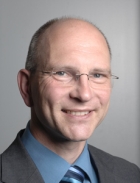
Prof. Thomas Stieglitz, is a professor for Biomedical Microtechnology in the Institute for Microsystem Technology (IMTEK) at the University of Freiburg (Germany). His work focuses on the development of biocompatible assembling and packaging techniques and the application of microsystems for neural prostheses and neuromodulation. His research interests include biomedical microdevices, functional electrical stimulation and biohybrid systems for screening and therapeutical applications.
In 2000 he received the science award of the Saarland State for his work on flexible, neural prostheses. Prof Dr Stieglitz qualified as a university lecturer in 2002 at the Saarland University in biomedical microsystem technology. Prof Dr Stieglitz worked with the Fraunhofer-Institute for Biomedical Engineering (IBMT) from 1993 to 2004, where he established the research work on biomedical microsystems for neural prostheses, which finally led to the IBMT Neural Prostheses Group.
Prof Dr Stieglitz is a member of the IEEE Engineering in Medicine and Biology Society (EMBS), the German Engineering Society (VDI) and the German Society for Biomedical Engineering (DGBMT) within the German Electrotechnical Society (VDE) where he is chair of the Functional Stimulation Section. He is also the founding member of the International Society for Functional Electrical Stimulation (IFESS). Prof Dr Stieglitz holds 10 patents and has authored/coauthored 65 journal papers and more than 200 reviewed conference papers in the field of neural prostheses.
In 1998 he received the Dr.-Ing. degree (summa cum laude) in electrical engineering from the University of Saarland (Germany). This work was honored with the ‘Stiftung-Familie-Klee’ award for young scientists from the German Society for Biomedical Engineering (DGBMT) in 1999.
Graduate School of Information Sciences,
Hokkaido University, Japan

Prof. Yuzuru Tanaka has been a full professor of computer architecture at the Department of Electrical Engineering (1990-2003), then of knowledge media architecture at the Department of Computer Science, Graduate School of Information Science and Technology (2004- ), Hokkaido University, and the director of Meme Media Laboratory (1995- ), Hokkaido
University.
He was also a full professor of Digital Library, Graduate School of Informatics, Kyoto University (1998-2000), has been an adjunct professor of National Institute of Informatics (2004- ), and is also an affiliated scientist of the Institute of Computer Science, Foundation for Research and Technology-Hellas. He is currently one of the 3 series editors of Springer LNAI (lecture Notes in Artificial Intelligence). He is currently a team leader of one of the four teams which are jointly conducting a new national project of Japan (feasibility study:06/2011-03/2012, main project:09/2012-03/2017) on Efficient Social System Services based on Human-Cyber-Physical Infrastructure Systems. This project was initiated by MEXT (Ministry of Education, Culture, Sport, Science, and Technology). His team focuses on efficient snow plowing and removing based on exploratory visual analysis of both probe-car data and a huge variety of related physical and cyber world data, where he extensively applies his framework on improvisational federation of knowledge resources.
Professor of Biomedical Engineering
Biomedical Engineering Department
Northwestern University
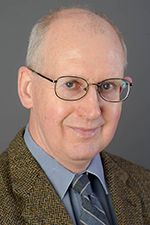
Prof. John B. Troy has been engaged in neuroscience research for more than 30 years, starting with his doctoral work studying visual signal processing by neurons of the cat lateral geniculate nucleus. He has continued throughout his career to investigate the functional properties of neurons of the retina and lateral geniculate nucleus of cat, monkey, mouse and rat. He has also investigated how different classes of retinal ganglion cell tile the retina. The underlying theme of this work has been to arrive at a full quantitative description of how retinal ganglion and lateral geniculate cells encode visual information in mammals, including the human being. Recently, Dr. Troy has expanded this effort to consider how the retina changes in disease states and what can be done to retard or reverse these changes. He has been collaborating with Dr. Xiaorong Liu in a study of ocular hypertension. Using a mouse model of glaucoma, they are investigating the progression of the disease and some drug treatments that might be effective in delaying or halting its progression.
More recently, Dr. Troy has expanded his interest to include technology development that can be used either to restore neural function or to assist neuroscience research, including the development of therapeutic agents. His laboratory has provided insight into how stimulus waveforms can be shaped to minimize tissue and electrode damage during electrical stimulation. It has developed and tested the effectiveness of nanoscale tipped electrodes for recording extracellular action potentials from mammalian axons in vivo. Since feasibility of nanoscale tips for neural recording has been established, one of the remaining challenges is to customize these tips to reduce impedance and improve recording signal over noise. His laboratory has also developed a new version of the patch clamp electrode which should permit longer term stable recordings of higher bandwidth than existing models. A variant of the system has been developed to avoid run-down of diffusible cytoplasmic compounds, ensuring a more physiological recording situation. The Troy laboratory has also been collaborating with Dr. Laxman Saggere and his students to develop a chemical neural prosthesis for diseases of photoreceptor degeneration. Under ideal conditions, this prosthesis would be implanted in the subretina following photoreceptor degeneration. If this can be accomplished, advantage can be made of the surviving retinal circuitry. One of the major challenges faced is to engineer a device that is flexible, photoactivated and which can incorporate a sufficiently large reservoir of neurotransmitter. This device is targeted for patients with the incurable diseases retinitis pigmentosa and age-related macular degeneration, with incidences of 1-2 and 20-25 million. Finally, Dr. Troy has recently begun a new project to develop a thalamic visual prosthesis. The goal is to implant electrodes into the lateral geniculate nucleus bilaterally to treat patients blinded through glaucoma, optic neuritis or bilateral eye loss. There are 60 million worldwide with glaucoma, 2-5 million with optic neuritis and 2 million with bilateral eye loss. There are many significant engineering challenges to this project, ranging from biocompatibility of the implant to safe charge injection regimens to mechanical mismatch between the electrode materials and brain tissue.
Emeritus Professor, University of Geneva
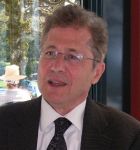
Prof. Dennis Tsichritzis is currently President of the Board of the Technical
University of Crete, Greece.
He received his degrees in electrical engineering and computer science from Athens
Technical University (diploma 1965) and Princeton (PhD, 1968).
From 1968 to 1985 he was professor of computer science at the University of
Toronto. He was also professor at the University of Crete and director of the Institute
of Computer Science in Crete. From 1985 to 2002 he was professor of Business
Informatics and director of the Centre Universitaire d’ Informatique at the University
of Geneva. From 1991 to 2001 he was Chairman of the Board and chief scientist of
GMD (German National Research Center for Information Technology). From 2001 to
2006, he was Senior Vice President and member of the Executive Board (CIO,
International Business Development) of the Fraunhofer-Gesellschaft, Germany, a
leading organization of applied research in Europe. Fraunhofer-Gesellschaft has 66
Institutes and Research Centers, about 24,000 employees and an operating budget
close to 2,000 Million € per year. From 2006 to 2008 he was President of Fraunhofer,
USA.
From 2008 to 2011 he was General Manager at RICOH ESRO (European Strategic
Research Organization) for the large Japanese multinational RICOH Company, Japan.
Director of Biocomputing and Bioinformatics Core in Emory-Georgia Tech Center of Cancer Nanotechnology Excellence,
Wallace H. Coulter Dept. of Biomedical Engineering
Georgia Institute of Technology
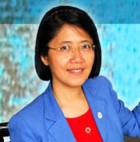
Prof. May D. Wang is associate professor, GCC distinguished cancer scholar and Director of Biocomputing and Bioinformatics Core in Emory-Georgia Tech Cancer Nanotechnology Center at the Wallace H. Coulter Department of Biomedical Engineering at Georgia Tech and Emory University. Dr. Wang’s primary research interest is biomedical and health informatics in systems medicine and healthcare, with the goal to speed up the discovery, development, and translation in modern biology, medicine, and health. She has played an active role in several working groups within National Cancer Institute (NCI/NIH) cancer Biomedical Informatics Grid (caBIG) , and FDA-led Microarray Quality Control Consortium (MAQC) on biomarker and nanomedicine for personalized medicine. As the corresponding or co-corresponding author, Prof. Wang has published in journals such as Annals of Biomedical Eng, BMC Bioinformatics, Trends in Biotechnology, Nature Protocols, Proceedings of National Academy of Sciences, Annual Review of Medicine, and The Pharmacogenomics Journal.
Dr. Wang received Distinguished Cancer Scholar Award from Georgia Cancer Coalition in 2004, an Outstanding Undergraduate Research Faculty Mentor Award from Georgia Tech in 2005, and an Outstanding Service Award from IEEE BIBE in 2007. She is appointed as the Chair of Technical Committee on Information Technology for Health in IEEE Engineering in Medicine and Biology Society (EMBS) in 2011, and serves as associate editors for a couple of journals. Dr. Wang received Ph.D.EE, multidisciplinary MS degrees (EE, Applied Math, and CS) from Georgia Institute of Technology in USA, and BEng from Tsinghua University in China. In addition, Dr. Wang has several years of industrial R&D experience in the former AT&T Bell Labs, Intel Architecture Labs, Hughes Research Labs, Lucent Technologies Bell Labs, and Agere Systems. Dr. Wang was recently inducted to the College of Fellows of AIMBE.
Department of Biomedical Engineering,
Tulane University
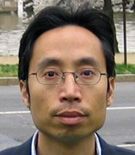
Prof. Yu-Ping Wang is an Associate Professor of Biomedical Engineering at Tulane University and also an adjunct member of Biostatistics. He was an Assistant Professor of Computer Science and Electrical Engineering at the University of Missouri-Kansas City. He got his Bachelor and Master degrees in Applied and Computational Mathematics, and PhD in Communication and Electronic Systems from Tianjin University and Xi’an Jiaotong University respectively. From 1996 to 1998 he was a research fellow at the Center for Wavelets, Approximation and Information Processing at the National University of Singapore (NUS). He then had research training on cardio-vascular image analysis with tagged MRI at Washington University Medical School in St. Louis in 1999. From 2000 to 2003, he worked at Perceptive Scientific Instruments (PSI) Inc and Advanced Digital Imaging Research (ADIR) in Houston, where he has involved with a variety of bio-imaging and bioinformatics projects under the NIH Small Business Innovation Research (SBIR) support. His current research includes genetic imaging, bioinformatics, multiscale mathematical analysis and various biomedical applications, where his work has been supported by NSF, NIH and industries.
Professor and Chair Elect, Department of Biomedical Engineering
Boston University
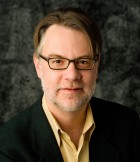
Prof. White’s laboratory uses engineering approaches to understand how information is processed in the brain, with the goal of exploiting these findings to improve the human condition. Ongoing and future research questions include the following:
1. Why is coherent electrical activity of the cortex necessary for mental processes like learning and memory?
2. What factors control this coherent activity, and how can such knowledge be applied to help patients with memory disorders and epilepsy?
3. How can recent advances in computing technology be exploited to develop electronic devices that detect brain dysfunction in real time and react to restore normal function in neurological patients?
4. Can we take advantage of nonlinear optical techniques to improve methods of measuring and controlling neuronal activity in reduced preparations and the intact brain?
5. How do calcium and other second messengers interact to influence short-term and long-term plasticity in synapses and in neurons?
6. How do glial cells contribute to epilepsy, and how can that knowledge be used to generate new therapies?
7. How can the principles of brain function be adapted to build novel “smart” devices?